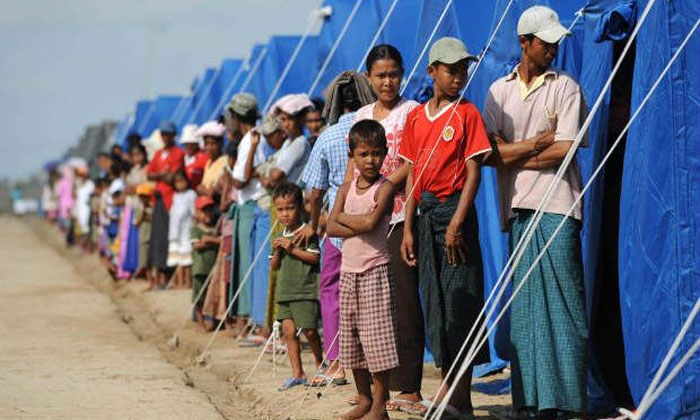Mohammed Shafeeq
Rohingya refugees living in Hyderabad are a worried lot amid growing threat of deportation in the wake of passing of Citizenship (Amendment) Bill by the Parliament and the proposed National Register of Citizens (NRC). With anxiety writ large on their faces, groups of refugees at the camps here are discussing among themselves the latest developments and their future. Unlike in the past when they used to open up narrating their tale of woes back home in Myanmar, their escape from the horror and expressing gratitude to India for allowing them to stay, they now are reluctant to talk to outsiders.
Staring at an uncertain future, they are apprehensive that the media coverage may single them out and thus hasten the process of possible deportation. At one such camp at Balapur in the southern part of the city, the inmates were hesitant to share their thoughts. They are directing media persons to the nearby office of the local coordinators of United Nations High Commissioner for Refugees (UNHCR). Some of the inmates at the camp said they will be happy to return to their homeland if they are assured of safety and their rights as citizens are restored.
“We will return when things become normal there. That’s all we want to say,” Bilal Hussain, who is in-charge of the camp,said. “The conditions have not improved there. There is still no peace and no security,” chips in another inmate Sultan Mahmood. “It is better not to say anything because if we say something we may land ourselves into trouble,” said another refugee, who did not want to be named. The camp is home to about 100 families living in utter wretchedness and unhygienic conditions in small huts made of tarpaulin roofs. Men work as rag-pickers, construction workers, vendors and do other menial jobs to eke out a living. The women in some families lend a helping hand by making food items to be supplied to small kirana shops or peeling off garlic and ginger.

The refugees have been living in fear since last year when seven Rohingyas, who were held in a Assom jail since 2012 for illegally entering India, were handed over to the Myanmar government after the Supreme Court turned down a plea to stop the government from deporting them. The deportation prompted UNHCR to remind New Delhi that the international laws required nations to refrain from sending refugees back to countries where they could still face danger. During the debate on CAB in Parliament this week, Union Home Minister Amit Shah made it clear that there is no proposal to grant citizenship to Rohingyas. About 20,000 Rohingya refugees said to be registered with UNHCR are living in India. Of them, 6,000 of them have found a home in Hyderabad.
They are scattered in various parts of south Hyderabad with refugee cards given by UNHCR as the only identity. Escaping the worst persecution in Buddhist-majority Myanmar and after losing many of their near and dear ones, they are relieved over finding a safe home in the city distant from their country. Thankful to India for allowing them to live here, they hope that they will not forced to go back to Myanmar, where there have no security. They are so scared that they say the government of India should kill them here instead of sending back. “We were born and brought up there. We had our agriculture fields and businesses. They destroyed everything. Snatched our citizenship and drove us out,” said Mohammed Yaseen, who lives in a small rented house in Shaheen Nagar. “We will be very happy to go back if we are assured of protection, if we get back our citizenship and all the rights,” he said.
Like many other refugees, Yasin keeps track of the developments relating to Myanmar over mobile phone. He browsed the Internet to keep himself abreast of the biggest development in many years when Myanmar’s civilian leader, Aung San Suu Kyi, testified before the International Court of Justice in The Hague. Suu Kyi, a 1991 Noble Peace Prize winner, denied allegations of genocide against Rohingya Muslims. “She uttered lies before the whole world. It is because of the persecution we are here in this state of helplessness and lakhs of our people are in Bangladesh,” said Yaseen, in his 30s. “We don’t know what decision they (international community) take. But if they take the right decision, there is no need to drive us out from here. We will go on our own,” said Yaseen, who married a Rohingya woman after migrating to Hyderabad seven years ago and has two daughters. “We remain indebted to India for allowing us to live here and we just hope that we won’t be sent back unless conducive atmosphere is created there for our return,” he added.













